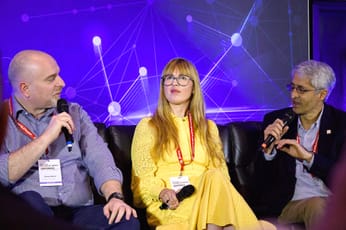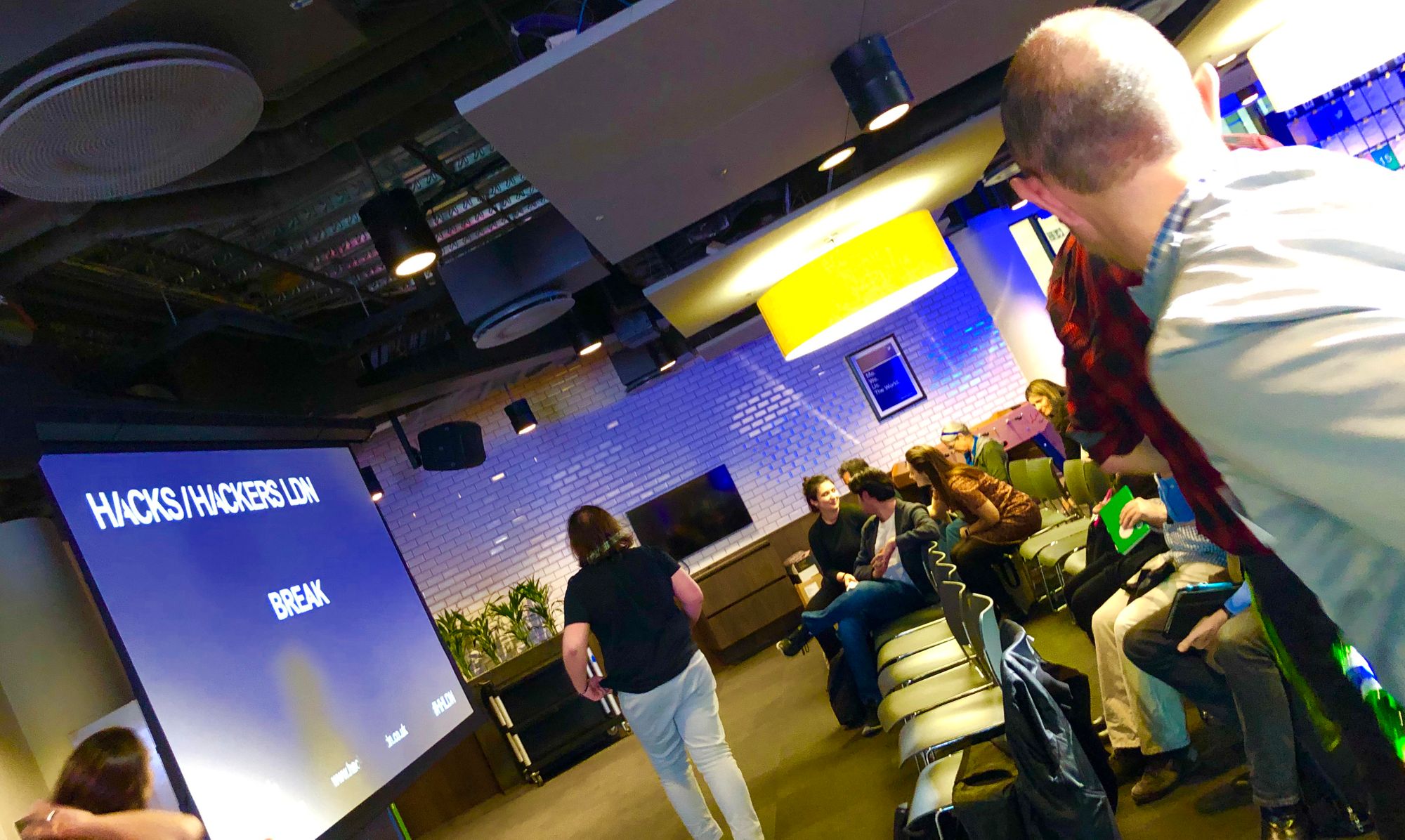
Hacks/Hackers London: AI, Fact-checking, a faster Economist — and better careers for women
May's Hacks/Hackers brought us AMP-based web-design, Facebook fact-checking, AI email checks, and a new organisation to support women in their careers.
My liveblogged notes from the Hacks/Hackers London meeting on 22nd May 2019, held at Twitter UK. More details and videos can be found on the Hacks Hackers London site. These notes are being updated through the session, and will be improved over the following 24 hours.
Duncan Eadie — Technologist at Charles Russell Speechlys

Everyone in this room carries a reputation - through education, through actions, through work, through association. Or even through working for companies with greta brands - the modern name for reputation. But reputation can disappear in an instant. And so can the data you hold.
Can AI protect your reputation? Duncan thinks so. He works for a law firm as a technologist. Law firms reply on their reputation. People send emails to the wrong person by mistake. We all do it. But sometimes we don't realise it straight away. Misaddressed emails is the biggest single source of data loss, according to the ICO. 0.42% of emails go to the wrong address. For a firm that sends 0.5m emails a month, that's 2,100 misaddressed emails.
How about an AI that examines the contents of your email before you send it - looking at patterns of subjects, groups of recipients, and even name used? They're using exactly that. And it's about the price of a coffee a month for each user.
Other benefits: it can spot people (or teams) who need support and training on data security, and it can prevent sensitive data "leaving the company with an employee.
Grace Rahman — Full Fact
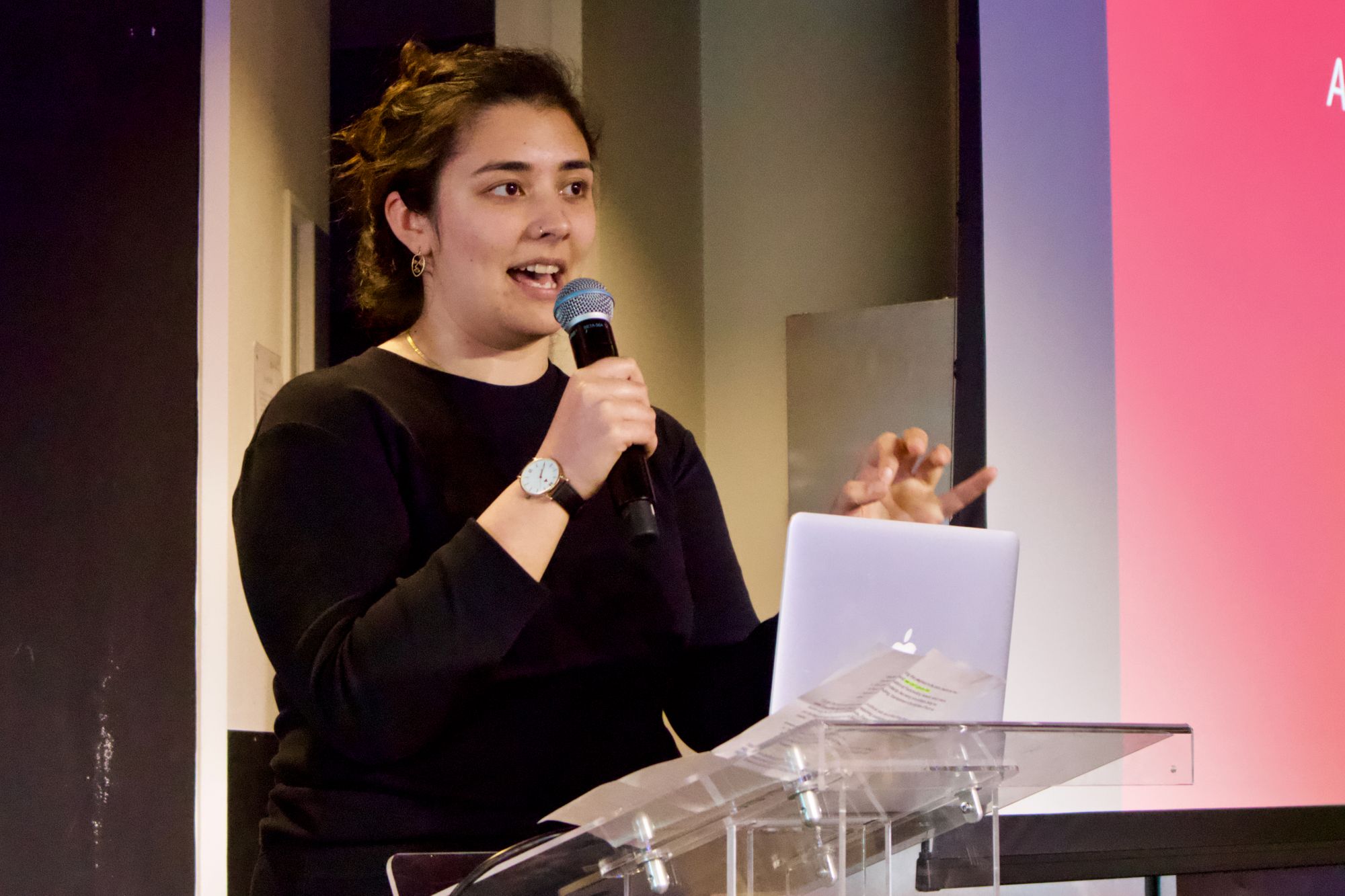
Full Fact fact check people in the UK - often politicians, but also pressure groups, companies and even individuals if they happen go go viral. In the medium term, they work for corrections on the record, and in the long term, they're working for societal change. They have around 20 employees, focus on facts, not opinions, and are a charity.
They work hard to make sure they are fact-checking all sides, to remain impartial. They priorities the ones that have the biggest impact - often the biggest reach.
How @FullFact decides what to fact check #hhldn pic.twitter.com/Ex55hv13zN
— Andrew Grantham (@andrew_grantham) May 22, 2019
They talk to data producers like the ONS, for example. They have two sets of automated fact-checking: trends, which picks up on current issues, and a Live tool, used for things like PMQs. It's not there to replace people, but to do the easy bits, which leaves the complicated ones to the humans.
They've been awarded a grant from the Google AI Impact Challenge, alongside other organisations.
Working with Facebook
They've been working with Facebook as their first UK fact check partner for about 5 months. They get a queue of material from Facebook, including numbers of shares and number of reports. They prioritize by harm, both stuff like ant-vaxx material, but also democratic harm - things that undermine elections. The fact-checked material is given a rating based on Facebook's system.
Classifications of stuff on Facebook #hhldn pic.twitter.com/rDVZHMNN2x
— Andrew Grantham (@andrew_grantham) May 22, 2019
Facebook still distributes false posts, but it reduces distribution and adds notifications around it. Facebook doesn't get "pre-approval" of their work, and Full Fact can add material to the queue on their own, but they don't do it often. And not all the debunking is serious - including a "horse that lived in a flat"…
Q&A
Are they a "whitewash" for Facebook? They think tis project is worth doing. Could Facebook be doing more? Of course. But this is worthwhile. There is a public report on how the partnership has working coming - and it will be public.
Is the Backfire Effect a problem? They have a researcher as part of the team, who is looking at the psychology of fact-checking. Early results suggest that effect is not as prominent as has bene suggested - but it is early days.
Factchecking speed varies hugely - some are quick, some take weeks. They're doing about 20 a month at the moment.
Penny Jones & Beth Squires - My So Called Career
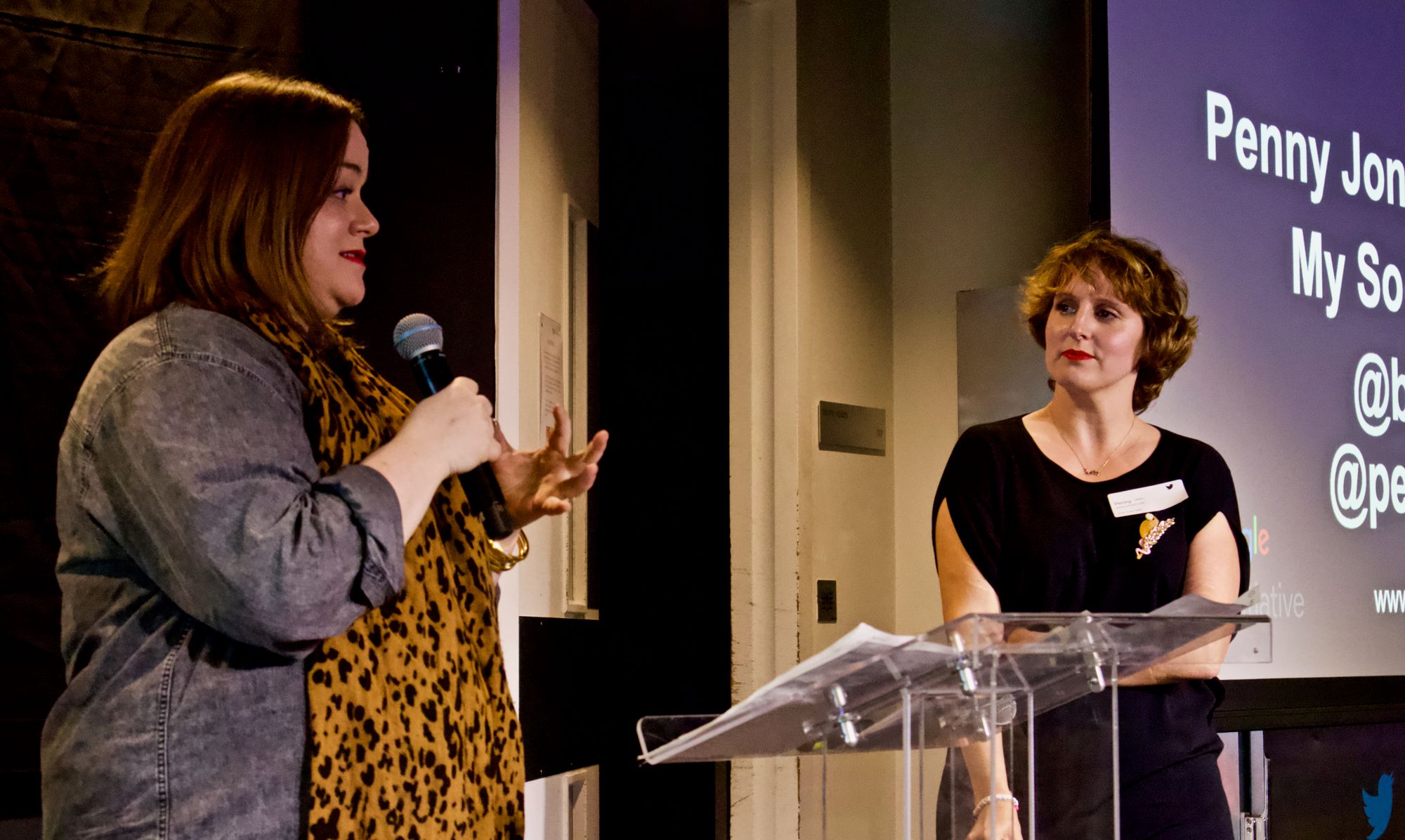
Women have a 53% higher rate of work stress and depression than men - and it comes at a time when they're pulling various ways.
They want to create a frank and open conversation about the reality of work - to debunk the social media image, and to help people get real clarity about their won work and lives, without judgement.
For 10 weeks this autumn, they'll be running a series of workshops for their first cohorts. There will be a kick off event in July, for Hacks?Hackers women - and women aligned to that community. It's an opportunity for you to tell them what's on their mind. If you want inspiration, practical skills to develop, or a means to implement a vision - this if for you. It's for you if you just want to figure out what you're doing — or if you just want to hang our with some kickass women.
Why partner with Hacks/Hackers? Media and tech are industries where it can be suck to be a woman. Tech's gender bias is well-known, but media is still dominated by men. Penelope quit a dream job in strategy at Condé Nast, and was at The Guardian before that. And during that time was a massively competitive workaholic - and had three nervous breakdowns. Beth works at Vogue Business, and has worked in both in-house and consulting roles across a range of publishers. The other founders are Frederica and Rose.
Between them, they've learn a huge amount, and met a huge range of amazing people. Come and join them.
So thrilled to launch My So-Called Career at #HHLdn this evening with the amazing @penelopejones. A course of honest talks, workshops, and digital support for early and mid-career women, with no #girlboss instabullshit. @HacksHackersLDN #mysocalledcareer
— Beth Squires (@bethsquires) May 22, 2019
Lizzie Hard & Olivia Frost - The Economist
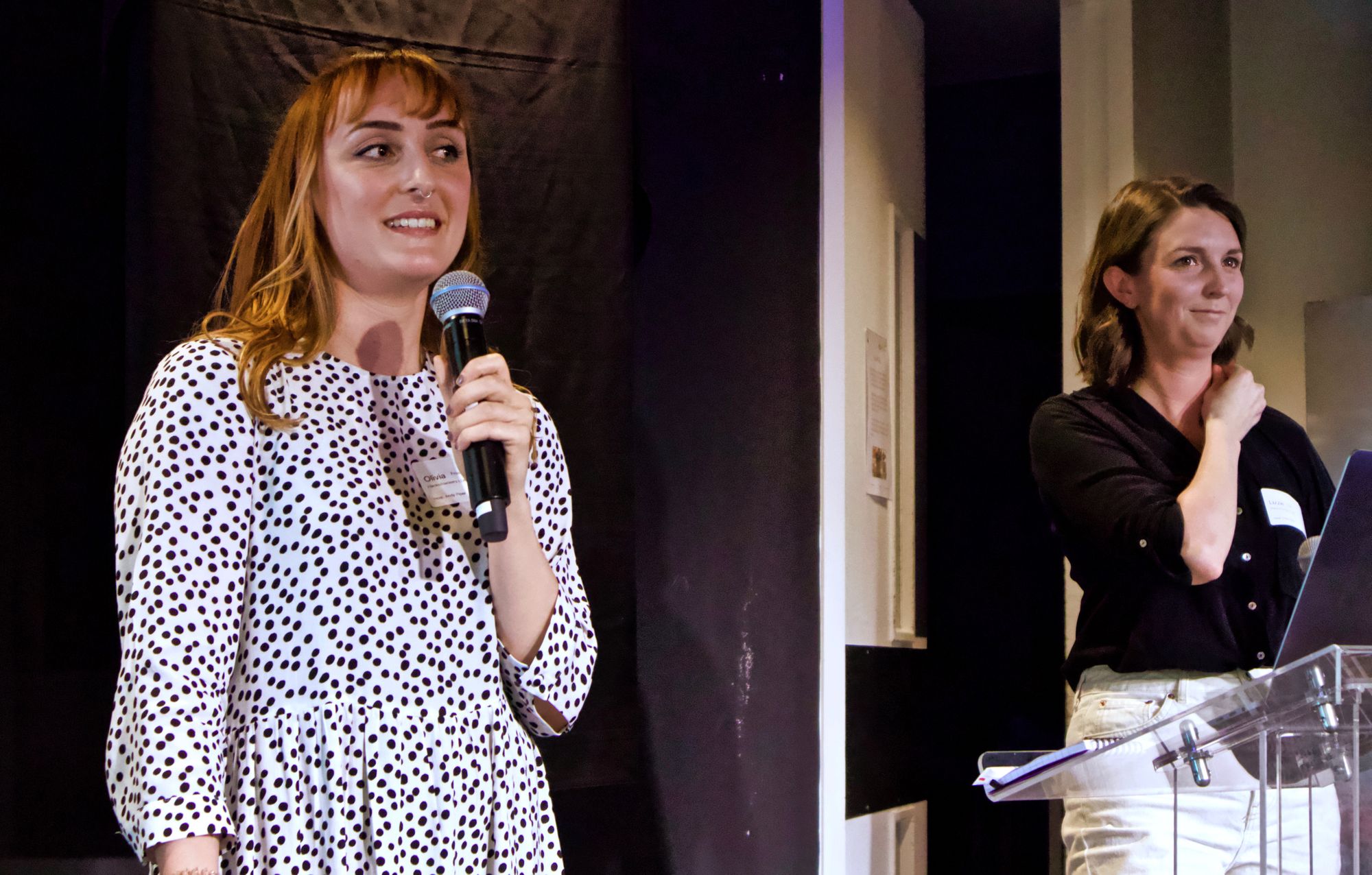
Lizzie and Olivia are software engineers in the engagement team. The Economist needs a website that matches the quality of its journalism. And it didn't have it. The site doesn't really focus on breaking news, and so has an engagement strategy that's different to many sites. They settled on a metric that made sense for them: reducing bounce rate. And they had to own the whole journey to deliver that.
They started compiling feedback from the web on their existing site. They printed it out and stuck it on the wall as the Wall of Shame. There were a LOT of popups on there — here's one brutal example — and that was their own fault. They had built all that themselves. It was time to change that.
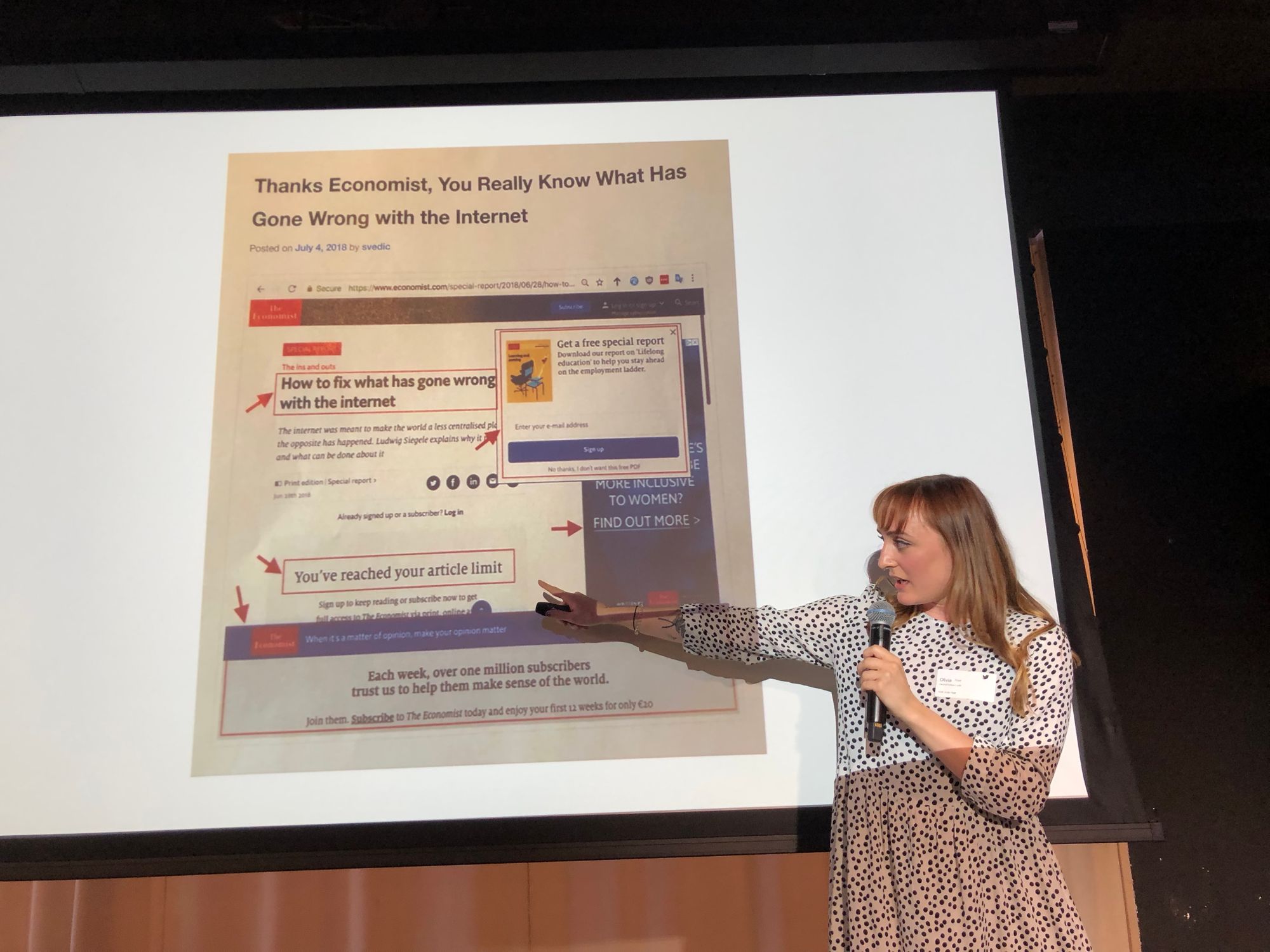
Their Principles
- Reader Experience - which needed to match the editorial quality
- Code quality - easy to add to, easy to maintain
- Site performnace - faaaaaaast
- Team culture - a genuine cross-disciplinary team.
They involved the editorial team, and built a unified content strategy across their products.
Some of the UI changes were quite significant. They changed the registration wall display to make it clear there was more content in the article.
Fade out on the right hand version shows the @TheEconomist article has more content #hhldn pic.twitter.com/3aP6w3TXJ3
— Andrew Grantham (@andrew_grantham) May 22, 2019
They also clarified and separated the registration and subscriber journey.
Their Stack
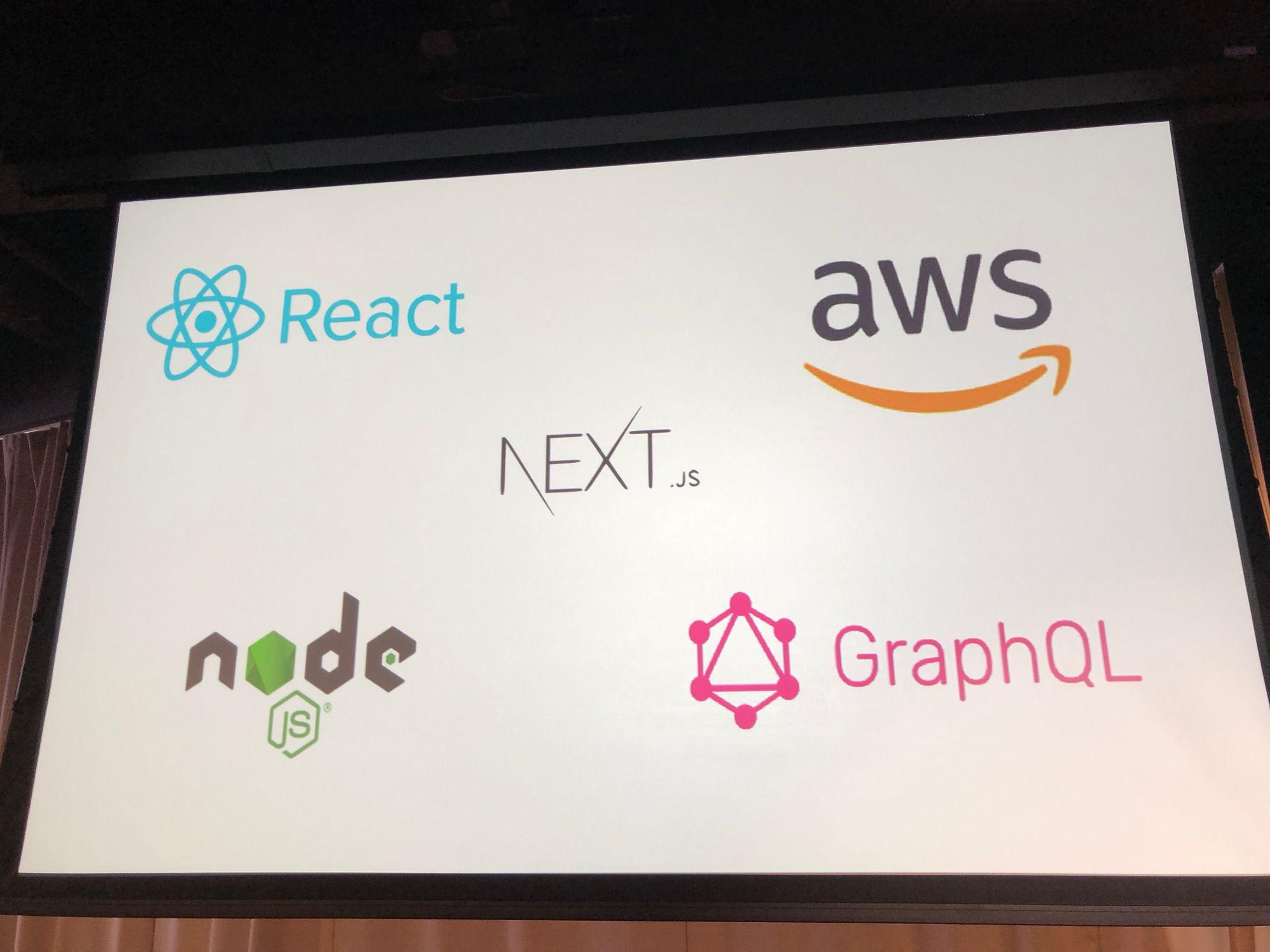
They have the freedom to use the technology they choose - but they have exerted central control over that. There's a real danger that, if tech is added by other parts of the company without oversight, you get an accretion of load that dramatically slows site performance. This is another reason it's so important that they own the whole journey.
Results
They launches the new AMP site in March. Not only has the bounce rate dropped, but daily registrations have jumped from 5o to 300 per day - and are holding steady. Next up are the main site article pages, followed by topic and section pages, and finally the home page.
Hacks/Hackers London: New Parents workshop
The media and tech industries are poor at handling parental leave — and also poor and helping staff manage the transition back to work. Even worse, there's often no support at all for freelancers and contractors. Hacks/Hackers London is hoping t =o address that with a session — or series of sessions — focused on new parents looking to return to work. They're very interested in feedback on the practicalities of such a session, including wether on-site childcare would be a prerequisite.
Please drop them a line.
For everyone at #hhldn and/or interested in a workshop for new parents struggling to get back into the news/tech industries. We’ll send out a questionnaire but if you have thoughts now email Liz: liz@hackshackersldn.co.uk
— Cassie Werber (@cassiewerber) May 22, 2019
Sign up for e-mail updates
Join the newsletter to receive the latest posts in your inbox.







